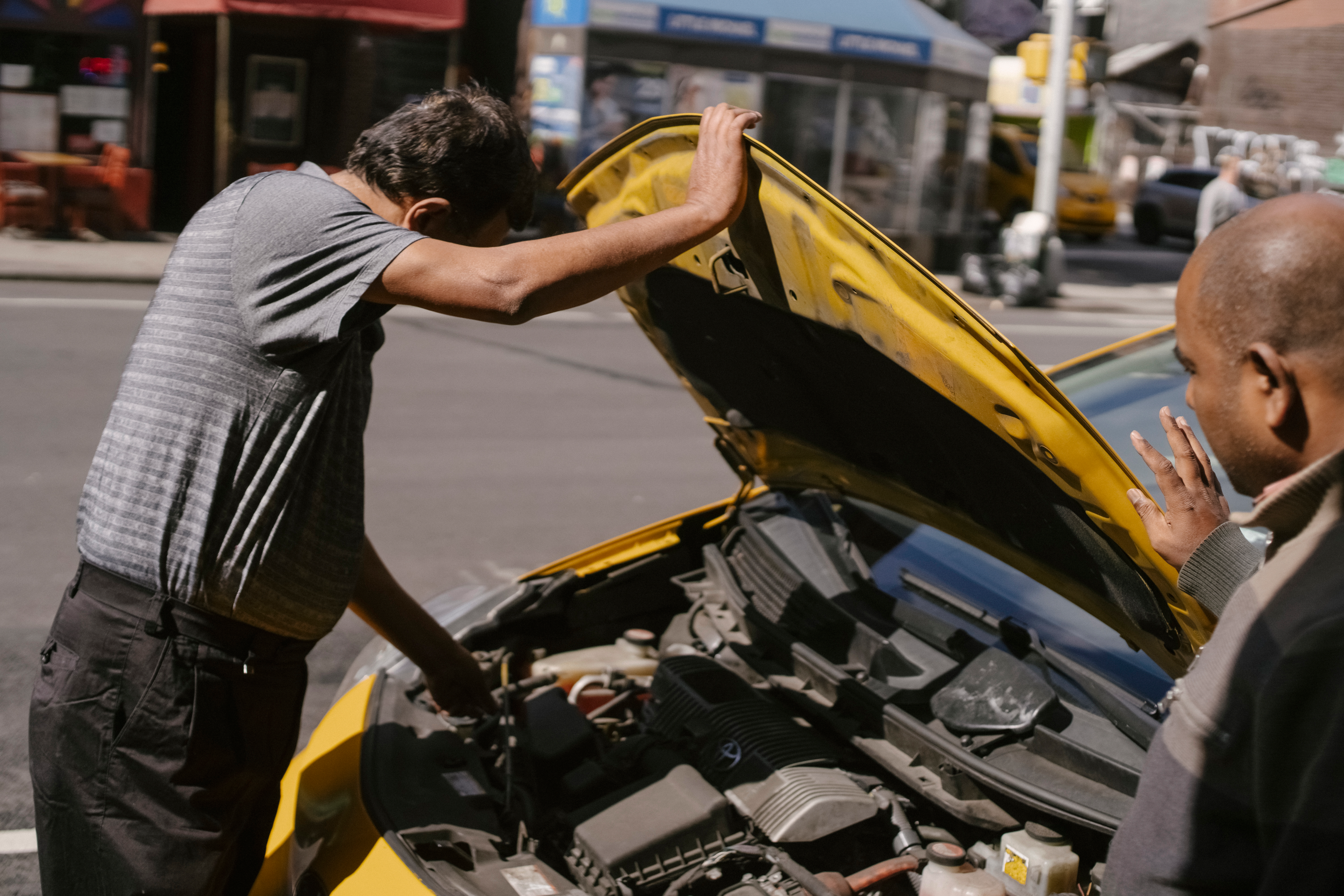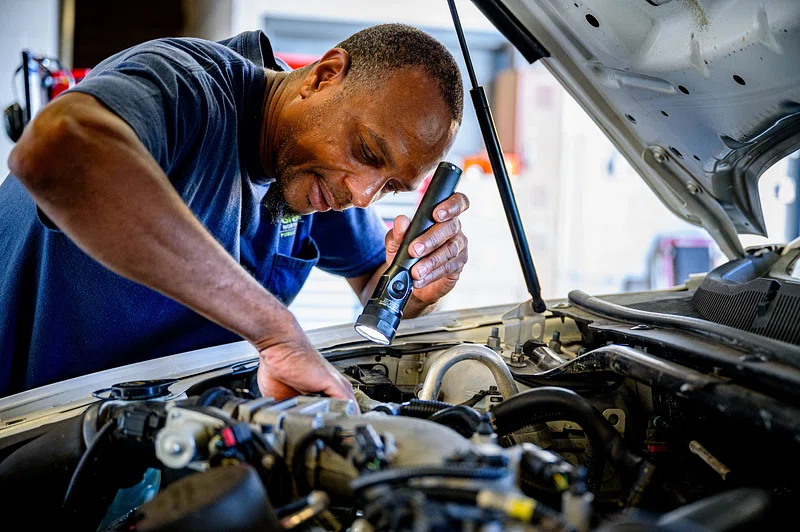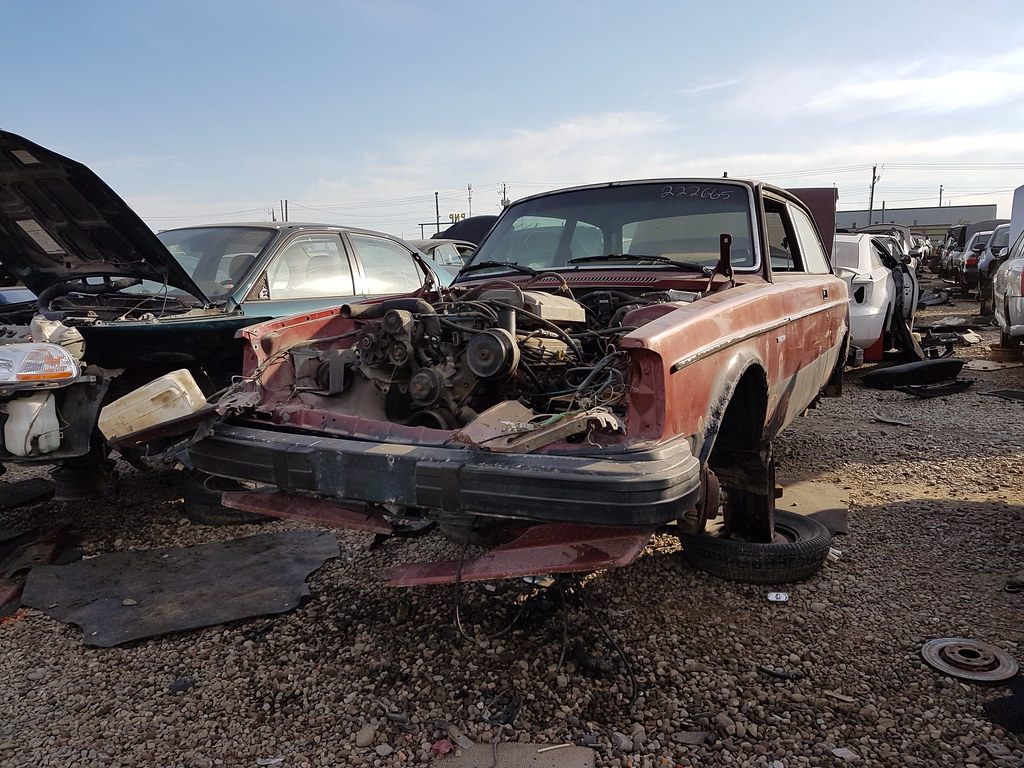Selling a car can be a challenging task, especially when it has a bad transmission. However, fret not! In this comprehensive guide, we will walk you through the ins and outs of how to sell car with bad transmission, helping you make the best decision for your unique situation. From understanding transmission problems to weighing your options and finding the right buyer, we’ve got you covered.
Key Takeaways
- Understand the signs and symptoms of a bad transmission, as well as its causes.
- Consider factors such as age, overall condition and potential resale value when deciding to repair or sell your car with a bad transmission.
- Research reputable online car buyers for convenient transactions, free towing services and complimentary paperwork assistance.
Understanding Transmission Problems: Signs and Symptoms

Recognizing the signs and symptoms of a bad transmission is key to addressing the issue before it becomes severe. Some common indicators of a failing transmission include slow or unresponsive gear shifts, shaking or jerking while running, a burning smell, strange humming or buzzing noises, and unexpected gear slipping. Additionally, other signs to watch for are leaking fluids, burning odors, delayed engagement, peculiar noises, activation of the check engine light, grinding of gears, and a change in the color of the transmission fluid.
Operating a vehicle with a defective transmission can result in engine overheating and significant repairs or damage. Therefore, it is not advisable to continue operating a vehicle with a malfunctioning transmission. But the good news is that junk cars with a broken transmission can still be sold. Options to consider include local dealerships, junk car buyers like Carmula. which specializes in buying cars with transmission issues.
Causes of Transmission Failure
Transmission failure in a damaged car mainly results from:
- Low transmission fluid
- A blocked transmission filter
- Torque converter issues
- Solenoid problems
A lack of maintenance can exacerbate these problems. Inadequate transmission fluid levels, caused by not regularly inspecting and maintaining the fluid, can lead to overheating and subsequent transmission failure. Additionally, a lack of maintenance can result in contaminated or dirty fluid, which can contribute to transmission issues.
Certain manufacturing defects can also result in transmission failure. These defects may include:
- Insufficient transmission fluid levels
- Defective seals that could cause fluid leaks
- Inadequate repair of punctures
- Overheating due to excessive heat in or near the transmission
Preventive Measures for Transmission Issues
Regular maintenance and immediate attention to issues can help prevent transmission problems. Necessary maintenance checks for car transmissions include:
- Examining the transmission fluid periodically
- Using the appropriate type of transmission fluid
- Servicing the engine’s cooling system
- Being cautious with braking and gear shifting
It is recommended to inspect transmission fluid approximately once a month and replace it every 50,000 to 100,000 miles.
Flushing a transmission involves replacing all of the transmission fluid and purging accumulated particles and deposits from the entire transmission. It should be done at intervals of 30,000 to 100,000 miles for an automatic transmission and 30,000 to 60,000 miles for a manual transmission. However, always check the recommendations of the specific auto manufacturer for your vehicle.
A major repair, such as a transmission rebuild, may be necessary if the transmission is severely damaged.
Evaluating Your Options: Repair or Sell?

Deciding between repairing and selling a car with a bad transmission can pose a challenge. Factors to consider include the worth of the automobile, the anticipated longevity of the vehicle, and the amount of capital invested in the automobile in recent times. Both repairing and selling have their advantages and disadvantages. Repairing can be more economical than purchasing a new car and can prolong the life of the car, but it can also be costly and time-consuming. On the other hand, selling can provide some compensation and be a speedy process, but you may not receive much money for it and may need to pay for repairs before selling.
Available choices for disposing of a car with a malfunctioning transmission are trading it in at a dealership, selling it privately, or selling it to a junkyard or scrapyard. Conversely, options for repairing a car with a bad transmission include having it rebuilt or acquiring another used vehicle.
Cost of Transmission Repair vs. Replacement
Transmission repair costs can range from approximately $800 to $3,400, depending on the severity of the issue and the location of the repair shop. The average cost of having a transmission rebuilt is around $1,400, while the average cost for a replacement is approximately $2,800.
Choosing a trustworthy and reliable repair shop for transmission rebuilding is a crucial step, as a transmission is composed of numerous internal components that cannot be seen. Warranties for transmission rebuilding may differ based on the shop, with some offering one, two, and three-year warranty options.
Factors to Consider When Deciding
Factors like the car’s age, overall condition, and potential resale value need to be considered when deciding whether to repair or sell a car with a bad transmission. It is essential to assess the potential resale value of the car by determining what the car value would be in fair condition and then adjusting it for the poor condition caused by the transmission problems. The price would need to be reduced accordingly, taking into account the cost of transmission repairs and the potential loss in value.
Each selling method has its advantages and disadvantages. Here are the options:
- Selling the car privately: This can yield a higher price but requires more effort and transparency about the car’s condition.
- Trading in the car at a dealership: This can be convenient, but you may not receive the best price.
- Selling the car to a junkyard or scrapyard: This can be quick and easy, but you may not receive the highest return.
Selling Your Car with a Bad Transmission: Pros and Cons

Selling a car with a bad transmission can be done through various methods, each with its pros and cons. Private sales, dealership trade-ins, and selling to junkyards or scrapyards are all viable options, but the best choice depends on the individual’s preferences and circumstances.
This section explores the pros and cons of each method to aid you in deciding the most suitable option.
Private Sale
While private sales can potentially result in a higher price for your car with a bad transmission, they demand more of your effort. You will need to advertise your car, communicate with potential buyers, and be transparent about the car’s condition. It’s essential to accurately disclose the transmission problems to prospective buyers to avoid any legal issues in the future.
The key to a successful private sale is finding the right buyer who is willing to pay a reasonable price for the car, knowing that they will need to address the transmission issues themselves.
Dealership Trade-In
Choosing to trade in your car with a bad transmission at a dealership could be a convenient alternative. However, the value of the vehicle may be reduced due to the damaged transmission. Dealerships may offer you the scrap metal value for your car, even if it can be repaired and resold.
Trading your car in at a dealership might appear to be an easy solution, but it severely limits your choices. You will only have access to the selection of vehicles available at that particular dealership.
Selling to a Junkyard or Scrapyard
Selling your car with a bad transmission to a junkyard or scrapyard can be a quick and easy process, but may not provide the highest return on your investment. The car worth at a junkyard or scrapyard is usually calculated based on the weight of the car and the current market value of scrap metals.
The typical price range offered by junkyards or scrapyards for cars with bad transmission can vary, but it is generally between $150 and $300.
Online Car Buyers for Cars with Transmission Problems
Online car buyers present a convenient and hassle-free alternative to traditional selling methods for less than perfect cars with transmission problems. They specialize in purchasing vehicles with these issues, making the process more straightforward for the seller. Examples of highly regarded online car buyers for vehicles with transmission issues include Carmula.
The upcoming sections will delve into the benefits of selling to an online car buyer and provide tips for selecting the right one.
Benefits of Selling to an Online Car Buyer
Selling to an online car buyer offers several advantages compared to other methods. Carmula typically provide fair market offers for your car, hassle-free transactions, and free towing along with complimentary paperwork assistance.
This means you can sell your car with a bad transmission from the comfort of your own home, without having to deal with the complexities of private sales or trade-ins at dealerships.
How to Choose the Right Online Car Buyer
Choosing the right online car buyer involves:
- Researching their reputation
- Reading customer reviews
- Checking their rating or reputation on reliable review websites such as Trustpilot, Google Reviews, or the Better Business Bureau
Additionally, compare prices and services offered by different online car buyers to guarantee the best value for your car with transmission problems. By conducting thorough research and considering these factors, you can find the best online car buyer for your needs, ensuring a smooth and successful transaction.
Preparing Your Car for Sale: Tips and Best Practices
Once you have settled on the best method for selling your car with a bad transmission, you can begin preparing it for sale. This involves setting a realistic price, gathering the necessary paperwork, and being prepared to negotiate with potential buyers.
This section offers useful tips and best practices to facilitate a smooth and successful sale process.
Setting a Realistic Price
To set a realistic price for your car with a bad transmission, follow these steps:
- Research the market value of similar cars in good condition.
- Adjust the price based on your car’s transmission issues.
- Consult valuation guides such as Kelley Blue Book or Edmunds for up-to-date pricing data based on factors including the car’s make, model, year, mileage, and condition.
- Examine live prices on the internet and at dealerships to gain an understanding of the car’s worth in the current market.
By following these steps, you can ensure that you are setting a fair and realistic price for your car with a bad transmission.
Negotiating with Buyers
Negotiating with buyers requires transparency about your car’s condition and being open to reasonable offers. Here are some tips to keep in mind:
- Be upfront about the transmission problems and any other issues the car may have.
- Highlight any positive aspects or recent improvements to counterbalance the negative impact of the bad transmission.
- Be open to reasonable offers and be willing to negotiate.
By following these tips, you can increase your chances of successfully negotiating with buyers during the car buying process when they decide to buy cars, including your car.
When responding to lowball offers, be firm yet fair, and don’t hesitate to counter the offer or request a higher price, keeping in mind the realistic value of the car.
Summary
In conclusion, selling a car with a bad transmission can be a daunting task, but with the right knowledge and approach, it can be done successfully. By understanding transmission problems, evaluating your options, and utilizing the best method for your situation, you can maximize the return on your investment. Whether you opt for a private sale, dealership trade-in, or an online car buyer, being prepared and informed will ensure a smooth and profitable transaction.
Frequently Asked Questions
Can you sell a car with a bad transmission?
You can sell a car with a bad transmission by making the sale yourself or using a car buying service. This will ensure you get the most money for your “junk” car, compared to a dealership or trade-in.
How much should I sell a car with a bad transmission?
If your car has transmission issues, you should expect to receive around 50% of what it was worth in perfect working condition when you sell it.
What can you do if someone sells you a car with a bad transmission?
If you have recently purchased a car with a faulty transmission, contact an attorney to see about filing a claim – dealers must disclose this type of damage to buyers.
Should I fix transmission before selling?
Considering the condition of the car, it may be worth investing in replacing the transmission before selling. This would ensure the vehicle is up to standard for its sale price.
What are the common signs of a bad transmission?
Common signs of a bad transmission include slow or unresponsive gear shifts, shaking or jerking while running, a burning smell, strange humming or buzzing noises, and unexpected gear slipping.





 Who We Are
Who We Are Coverage Area
Coverage Area Donate
Donate